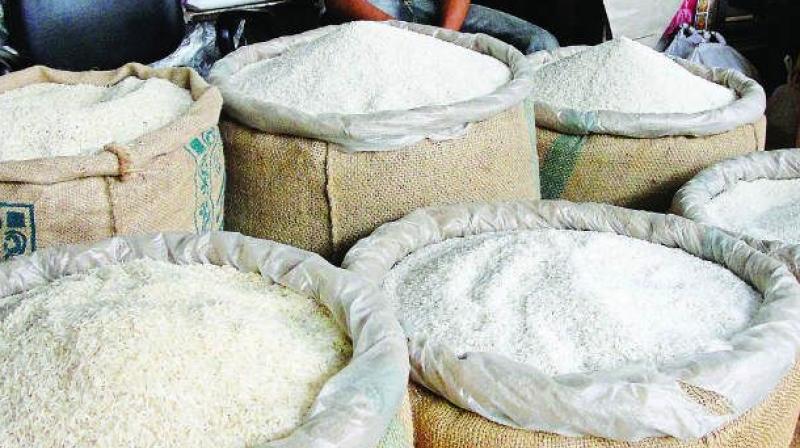Rice continues to dominate political scene in Tamil Nadu
Rice continues to dominate the political scene in the state.

CHENNAI: The state government’s decision to continue the free rice scheme at an additional cost of Rs 1,193 crores every year after accepting the National Food Security Act, is an indication that rice continues to dominate the political scene in the state, ever since the Dravidian movement won elections five decades ago promising three padis (14.5 kilos) for one rupee.
The decision to implement the National Food Security Act itself comes after much pressure from the Centre which warned the state of providing rice for above poverty line families only at Rs 22.54 per kg instead of Rs 8.30 per kg.
Though, one person and two person families are entitled only for 5 kg and 10 kg rice per month, Tamil Nadu would continue to give existing ration of 12 kg rice and 16 kg to these families too. As per the ration of 20 kg rice for every ration card, every member in the card would be entitled for 5 kg rice per month. This would increase the amount of rice provided for families with over four-members and a seven-member family would get Rs 35 kg instead of the 20 kg, it is getting now.
Though the scheme protects people below poverty line and poorer segments of people in villages and slums, not all who buy rice through ration shops are people who could not afford to buy the staple food in the open market. Middle and upper middle classes, especially in the rural areas, wait in long queues to have the free rice. Besides, selling ration rice and smuggling to other states continues to be a lucrative business in the state.
But, the decision to continue the free rice scheme stems from the fear of political backlash. The promise of giving 20 kg of free rice is one of the reasons for AIADMK's victory in the 2011 Assembly elections and the rollback of the scheme is certain to have adverse consequences. DMK chief M. Karunanidhi won the 2006 Assembly elections by playing the rice card in 2006 Assembly elections, when he announced that rice in PDS shops would be given at Re 1 per kg. The announcement which came amid the poll campaign when AIADMK supremo J. Jayalalithaa was drawing huge crowds for her public meetings, was a turning point in the polls.
According to Dravidian movement's historian Thirunavukkarasu, rice politics began as early as 1967 in Tamil Nadu and it is one of the factors on which the DMK rode to power, defeating a powerful Congress led by legendary leader K, Kamaraj. DMK under the leadership of its leader C.N. Annadurai, started raising the rice issue along with the Hindi plank from 1965 with party leaders taking up the issue inside and outside the Assembly.
“Bakthavatchalam annachi, arisi vilai ennachi” (What happened to rice price, elder brother Bakthavatchalam) was one of the famous slogans of the DMK at that time. Besides, the DMK made an election promise to provide three padi (4.5 kg of rice) at Re 1. DMK was at the receiving end in 1977 when AIADMK founder MGR took up the scarcity of rice during the DMK regime and dethroned the parent body. After capturing power too, he played to rice politics effectively. When a cyclone hit Tamil Nadu in 1977 and caused havoc, MGR government gave 75 kg of free rice to the affected people, which boosted his image of champion of the poor.
When DMK leader M. Karunanidhi returned from his 13-year long exile in 1989, the poor quality of rice in PDS shops was the focal point of Opposition attacks. They raised it in Parliament elections in the same year and routed the DMK, which did not win a single Parliament seat.

